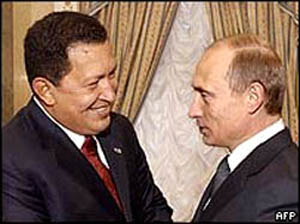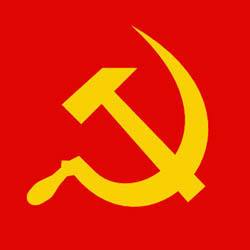 |
International Affairs
Coming Home to Lenin
Toby Westerman
Hugo Chavez, president of Venezuela, or more properly the Bolivarian Republic of Venezuela, urged the people of Russia “to revive the thinking of the founder of the Soviet Union, Vladimir Ilyich Lenin” and “come back to his ideas,” on the first full day of his June 27-30 visit to the Russian Federation.

Chavez encourages Putin to emphazise Leninist past
|
Chavez made his remarks about Lenin and the Soviet Union during festivities marking the opening of the Simon Bolivar Latin American Integration Center in Moscow, and was reported by Radio Havana Cuba, an official broadcasting source for the Cuban government.
Simon Bolivar was the early 19th century Venezuelan leader who freed much of Latin America from Spanish colonial rule, and attempted to unite Latin America under a single government, in a manner similar to the fledgling United States of America in the north. Chavez has adopted Bolivar’s concept of Latin American unity and is using it as a vehicle for his political agenda which he term’s “21st Century Socialism.”
Although the U.S. press continually describes Chavez as a “leftist,” his speeches in Venezuela, and now in Moscow, leave no doubt that Chavez sees himself in the tradition not only of Bolivar, but also of Marx and Lenin. Chavez considers Russia as an important ally in his struggle.
“Russia has risen again, and we, the people of the world, want Russia to become stronger,” Chavez declared. Russia, “like Venezuela,” is struggling against “imperialism,” asserted Chavez.
“Imperialism” in Chavez’s mind is synonymous with the United States.
“Either we will defeat American imperialism, or it will destroy the world,” Chavez warned his audience.
The mayor of Moscow, Yuri Luzhkov, also participated in the opening of the Bolivar Center, and he praised the “friendship, cooperation and closer cultural ties” between Russia and Venezuela, according to an English language report from communist Cuba’s Granma newspaper.
Part of that “friendship” and “cooperation” involves military hardware. Venezuela is Russia’s second largest customer for weapons, and Russia has already supplied Chavez with 100,000 advanced AK 103 assault rifles, sophisticated Su-30 Flanker jet fighters, air defense systems, and heavy transport helicopters. Chavez is currently shopping for more military equipment, from additional helicopters to possibly nine Russian submarines, five of the Kilo class, four of the Amur class.
Moscow is also assisting Venezuela in developing its petroleum and natural gas deposits.

Recently Russia's Parliament voted to restore the hammer and sickle to the Russian Army flag |
Despite the important financial and “cultural” ties between Moscow and Caracas, the government of Russian president Vladimir Putin has deliberately kept the reports of the Chavez visit understated in the Russian press, with diplomatic formalities at a minimum for Chavez, who arrived at night in Moscow. The Kremlin was concerned that the fiery Chavez could place Putin in an awkward position during his talks with U.S. president George W. Bush, which took place only days after the Chavez visit.
Chavez’s message of a return to Leninism, although diplomatically embarrassing, found a receptive audience in Russia. Even before his arrival, Chavez received an unprecedented invitation from the State Duma, Russia’s lower legislative house, to speak to the assembled members. No other state leader has been offered that opportunity before.
The invitation was offered because of Chavez’s “high popularity with the Russian legislators,” according to Konstantin Kosachev, chairman of the Duma’s International Relations Committee who issued the request, and was reported by Russia’s state news agency, RIA Novosti.
The speech, however, was cancelled shortly before Chavez’s arrival in Moscow.
Chavez, however, remains an important Russian asset. The opening of the Bolivar Center was attended by Yuri Luzhkov, a powerful figure among Russia’s political elite, and Putin later met with Chavez, who called the Russian president his “brother.”
Chavez’s call to Russia to “revive the thinking” of Lenin may be closer to reality than expected. There are those among the ranks of former Soviet dissidents and U.S. analysts who believe that the Russian state is already under the control of its intelligence services, known during the Cold War as the “KGB.”
While only a small minority of Russians want a return of the Soviet Union, the leaders of the old USSR are respected, and a majority of Russians yearn for the days when Soviet power commanded world respect. Most Russians even praise the material accomplishments of the mass murderer Stalin.
Putin has already said that the collapse of the Soviet Union was a “disaster,” and the Moscow elite is carefully cultivating the idea that the USSR was a positive force in the life of its citizens.
The KGB was known as the “sword and shield” of the Communist Party. The time when the sword of the “KGB” is again openly drawn to defend and advance the ideas of Marx and Lenin may be closer than Chavez – or the world – believes.

Posted July 9, 2007
Toby Westerman publishes
International News Analysis - Today
An investigative, analytical, and uncompromising weekly analysis of the world situation
Contact T. Westerman at
www.inatoday.com
or P.O. BOX 5182, Rockford, ILL, 61125-0182
|
International Affairs | Hot Topics | Home | Books | CDs | Search | Contact Us | Donate

© 2002- Tradition in Action, Inc. All Rights
Reserved
|
 |
|